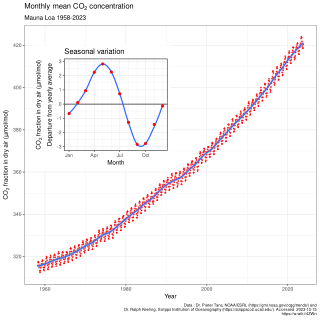
The North Atlantic Current (NAC), also known as North Atlantic Drift and North Atlantic Sea Movement, is a powerful warm western boundary current within the Atlantic Ocean that extends the Gulf Stream northeastward.

Harald Ulrik Sverdrup was a Norwegian oceanographer and meteorologist. He served as director of the Scripps Institution of Oceanography and the Norwegian Polar Institute.

The American Geophysical Union (AGU) is a 501(c)(3) nonprofit organization of Earth, atmospheric, ocean, hydrologic, space, and planetary scientists and enthusiasts that according to their website includes 130,000 people. AGU's activities are focused on the organization and dissemination of scientific information in the interdisciplinary and international fields within the Earth and space sciences. The geophysical sciences involve four fundamental areas: atmospheric and ocean sciences; solid-Earth sciences; hydrologic sciences; and space sciences. The organization's headquarters is located on Florida Avenue in Washington, D.C.

Charles David Keeling was an American scientist whose recording of carbon dioxide at the Mauna Loa Observatory confirmed Svante Arrhenius's proposition (1896) of the possibility of anthropogenic contribution to the greenhouse effect and global warming, by documenting the steadily rising carbon dioxide levels. The Keeling Curve measures the progressive buildup of carbon dioxide, a greenhouse gas, in the atmosphere.

Roger Randall Dougan Revelle was a scientist and scholar who was instrumental in the formative years of the University of California, San Diego and was among the early scientists to study anthropogenic global warming, as well as the movement of Earth's tectonic plates. UC San Diego's first college is named Revelle College in his honor.
Lynne Talley is a physical oceanographer at Scripps Institution of Oceanography known for her research into the large-scale circulation of water masses in the global ocean.

Eugenia Enriqueta Kalnay is an Argentine meteorologist and a Distinguished University Professor of Atmospheric and Oceanic Science, which is part of the University of Maryland College of Computer, Mathematical, and Natural Sciences at the University of Maryland, College Park in the United States.

Lawrence Mysak, is a Canadian applied mathematician, working primarily on physical oceanography, and climate research, particularly arctic and palaeoclimate research.

Dawn Jeannine Wright is an American geographer and oceanographer. She is a leading authority in the application of geographic information system (GIS) technology to the field of ocean and coastal science, and played a key role in creating the first GIS data model for the oceans. Wright is Chief Scientist of the Environmental Systems Research Institute. She has also been a professor of geography and oceanography at Oregon State University since 1995 and is a former Oregon Professor of the Year as named by the Council for the Advancement and Support of Education and the Carnegie Foundation for the Advancement of Teaching. Wright was the first African-American female to dive to the ocean floor in the deep submersible ALVIN. On July 12, 2022 she became the first and only Black person to dive to Challenger Deep, the deepest point on Earth, and to successfully operate a sidescan sonar at full-ocean depth.
Deborah K. Steinberg is an American Antarctic biological oceanographer who works on interdisciplinary oceanographic research programs. Steinberg's research focuses on the role that zooplankton play in marine food webs and the global carbon cycle, and how these small drifting animals are affected by changes in climate.

Diane McKnight is a professor of civil, environmental, and architectural engineering at the University of Colorado Boulder and a fellow at the Institute of Arctic and Alpine Research (INSTAAR). McKnight is a founding principal investigator of the National Science Foundation's Long-Term Ecological Research (LTER) program in the McMurdo Dry Valleys of Antarctica.

Anne Mee Thompson is an American scientist, who specializes in atmospheric chemistry and climate change. Her work focuses on how human activities have changed the chemistry of the atmosphere, climate forcing, and the Earth's oxidizing capacity. Thompson is an elected fellow of the American Meteorological Society, American Geophysical Union, and AAAS.
Adina Paytan is a research professor at the Institute of Marine Sciences at the University of California, Santa Cruz. known for research into biogeochemical cycling in the present and the past. She has over 270 scientific publications in journals such as Science, Nature, Proceedings of the National Academy of Sciences, and Geophysical Research Letters.
Barbara Mary Hickey is an Emeritus Professor of Oceanography at the University of Washington. Her research involves field measurements and computational models to understand coastal processes. She is a Fellow of the American Geophysical Union.
Rana Arnold Fine is Professor Emeritus at the University of Miami's Rosenstiel School of Marine and Atmospheric Science. Her research primarily addresses understanding ocean circulation processes over time through the use of chemical tracers and the connection to climate.
June Pattullo was an American oceanographer. She was the first woman to receive a PhD in physical oceanography. She was considered the "world authority" on sea levels and their dependence on heating and cooling of the ocean.
Ann Gargett is a Canadian oceanographer known for her research on measuring turbulence and its impact on biological processes in marine ecosystems.
Jean Lynch-Stieglitz is a paleoceanographer known for her research on reconstructing changes in ocean circulation over the last 100,000 years.
Sarah Gille is a physical oceanographer at Scripps Institution of Oceanography known for her research on the role of the Southern Ocean in the global climate system.
Delia Wanda Oppo is an American scientist who works on paleoceanography where she focuses on past variations in water circulation and the subsequent impact on Earth's climate system. She was elected a fellow of the American Geophysical Union in 2014.










